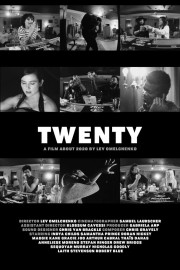Twenty
**Seen at the 2023 Atlanta Film Festival.
When we think of speakeasies, we think of bars that sold alcohol illegally during prohibition. In the context of “Twenty,” a speakeasy is a place where the individuals are about to freely speak about what they struggled with in 2020. Director Lev Omelchenko’s film is built not to create a discussion, but to allow its subjects to speak about their struggles, and give us a chance to listen as others work through their lives, and how much that year weighed on all of us.
The way Omelchenko structures his documentary, shot is beautifully composed black-and-white, based on a single archetype of the bartender being someone whose ear is open to his customers as they drink. We never see the bartender, as Omelchenko’s camera takes that point-of-view, as the customers tell them- and us- about their lives. Their successes, their struggles, their anxieties, their failures. The experience of transitioning for one person to the guilt about feeling like they have something to complain about in their life when others are struggling for another person; the real-life interaction with a conspiracist to being rattled by the systemic racism at the heart of the protests during the summer of 2020.
To say I was privileged to be not be able to work during 2020, and still maintain my way of living, is an understatement; thankfully, my mom was able to help us out financially while neither of us worked due to being furloughed from work. Watching “Twenty,” it brought back several of the thoughts I had that year as it felt as though I was in a personal crossroads in my life and career. The year the world stopped should have been a flashpoint for society where we returned to a life where we focused on other people’s struggles, and worked to solve societal problems that caused those struggles. Unfortunately, a year that should have brought us closer together only divided us further, to the point where sometimes, all you can do is find a sympathetic ear for your own emotions, and hope that what you say resonates with someone.
The individuals that come into “Twenty’s” bar are real people, and what they have to say is authentic. Omelchenko’s film is not entirely real, however; he uses interpretive dance performances at the beginning and end of the film, along with the other musical moments in the film. An earlier short of Omelchenko’s, “Free Noir Papillon,” uses dance to illustrate fears and hope regarding childbirth for a Black woman; here, it’s used to put us into a similar feeling, but one that is about taking us into the past rather than looking at the future. It is haunting, it left us uncertain, but in their words, as shared to the camera, these people feel a sense of comfort in the simple act of communication. That is this film’s gift to its individuals- these people are allowed to be seen, first by the camera, then by us.










